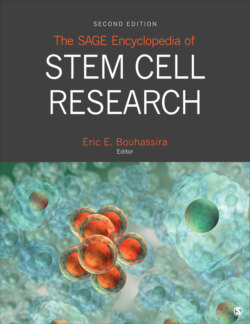Читать книгу The SAGE Encyclopedia of Stem Cell Research - Группа авторов - Страница 261
На сайте Литреса книга снята с продажи.
Reprogramming Cell Fate in C. elegans
ОглавлениеAside from inducing proliferative cells to undergo differentiation into specific cell types, C. elegans has also been used as a model organism for the study of redirecting cell fate. The process of dedifferentiation pertains to the reversal of a cell state, from a fully differentiated condition to an undifferentiated state, which is strongly characterized by features of high rates of proliferation and multipotency. Cancer stem cells, also known as tumor-initiating cells, possess this feature of dedifferentiation, thus allowing them to enter the cell cycle and produce more daughter cells that would further populate a specific region of the body, resulting in a tumor.
In C. elegans, differentiation of germ cells occurs at the distal end of the gonad. These germ cells are induced to enter meiosis and migrate toward the proximal end of the gonad, where more specialized cells are located. During this process, various regulators are secreted, including RNA-binding proteins the regulate self-renewal or differentiation of the germ cells. However, in the presence of other factors such as inhibitors of the MAPK signaling pathway and in the absence of RNA-binding proteins, fully differentiated cells are induced to dedifferentiate and enter mitosis, which is a common feature of undifferentiated stem cells. The application of RNA interference (RNAi) specific to downstream effectors of the MAPK signaling pathway can also stimulate C. elegans spermatocytes to undergo dedifferentiation, facilitating their entry into meiosis.
Previous studies have shown that these extracellular regulators comprise the molecular circuitry of cell fate reprogramming in the C. elegans, which are also highly likely to occur in other animal species, including humans. The PUF protein PUF-8 plays several roles in the development of the C. elegans germline. Inhibition assays targeting PUF-8 have shown that in the absence of or when the activity of PUF-8 is impaired through mutation or interference, primary spermatocytes undergo dedifferentiation and then proceed with their reentry into the mitotic cell cycle.
